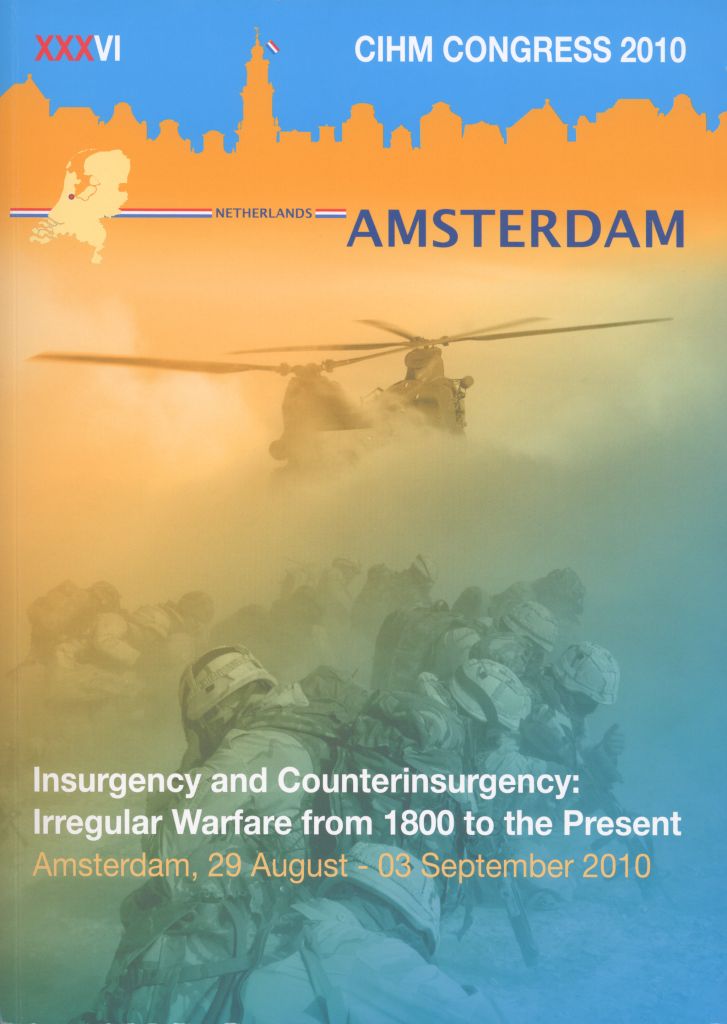« Clausewitz, la ‘petite guerre’ et la guerre insurrectionnelle »
Résumé de l’article en français au bas de la présente page // Abstract of the article in English below.
Article publié dans :
Insurgency and Counterinsurgency : Irregular Warfare from 1800 to the Present. Actes du xxxvie congrès de la CIHM (Amsterdam, 29 août-3 sept. 2010), La Haye, Netherlands Institute of Military History, 2011, p. 157-169.
Le texte intégral de la version publiée de l'article peut être consulté et téléchargé, au format PDF, en cliquant ICI.

Résumé introductif en français :
Les défaites subies en 1806 engendrèrent en Prusse une réflexion sur la défense nationale, sur l’armement du peuple, et sur la petite guerre comme tactique du peuple soulevé. Le Cours sur la petite guerre donné par Clausewitz à l’École supérieure de guerre de Berlin, entre 1810 et 1812, s’inscrit entres autres dans le fil de cette impulsion. Au reste, la guerre d’Indépendance américaine, insurrection contre la métropole anglaise, est au nombre des exemples choisis par Clausewitz pour alimenter sa réflexion, comme les guerres de Vendée et les épisodes tyroliens de la Révolution et de l’Empire, autres soulèvements à caractère insurrectionnel. Si Clausewitz n’opère pas pour ses auditeurs la distinction entre « petite guerre » et « guérilla », il pointe de temps à autre les particularismes des guerres civiles et des contextes guerriers avec armement du peuple. Cet article revisite le Cours sur la petite guerre de Clausewitz pour y relever la part redevable aux guerres populaires et aux insurrections, si tant est que, comme l’exprime Raymond Aron, la pensée de Clausewitz sur la guerre s’est construite en considérant le déchaînement des passions inhérent aux guerres populaires.
Abstract in English :
“Clausewitz, the ‘petite guerre’ [der kleine Krieg] and insurrectional war”
This article (as all my other articles on Clausewitz) isn’t a discussion “around” the thoughts of Clausewitz, which would be first based on Clausewitz – an attractive name! – in order to speak thereafter in a prospective manner, as we see quite often. My article is an analysis focussed on what Clausewitz actually wrote in his lectures on the “kleinen Krieg” [I would say here “small war” to be short, even if I don’t like this translation]. The aim is, first, making a synthesis of the thoughts of Clausewitz on the relations between the “kleinen Krieg” and insurrectional wars; and, second, explaining the context of that days which underlain his thoughts, in order to better understand them: the context related to 1) the wars on which Clausewitz bases his speech, 2) the military culture of the officers of that days (and also the military culture of Clausewitz) and 3) the reflection of his time on the “kleinen Krieg” and on insurrectional wars. Indeed, Prussia's military defeats in 1806 led in this country to a reflection on national defence, on the question of armed citizens, and on the “petite guerre” as the appropriate tactic for popular uprisings. The lecture upon the “petite guerre” that Clausewitz delivered at the War College in Berlin between 1810 and 1812 is part of this framework. Moreover, the Revolutionary War, which was an insurrection against the British homeland, is one of the examples Clausewitz did choose to feed his thinking, just like the Wars of the Vendée and the Tyrolean events during the French Revolution and the Napoleonic Wars – which were other uprisings with insurrectional characteristics. In his lecture, Clausewitz doesn’t distinguish between the two words and the two realities of “petite guerre” and “guerrilla warfare”; however, he shows from time to time the particularities of the civil wars and of the wars with armed citizens. Our article studies the lecture on the “petite guerre” from Clausewitz with a new point of view, in order to point out the parts which are related to the popular wars and to the insurrections; indeed, as Raymond Aron expresses it, the thinking of Clausewitz has been built on watching how the extreme violence of passions could not be separated from people's wars.